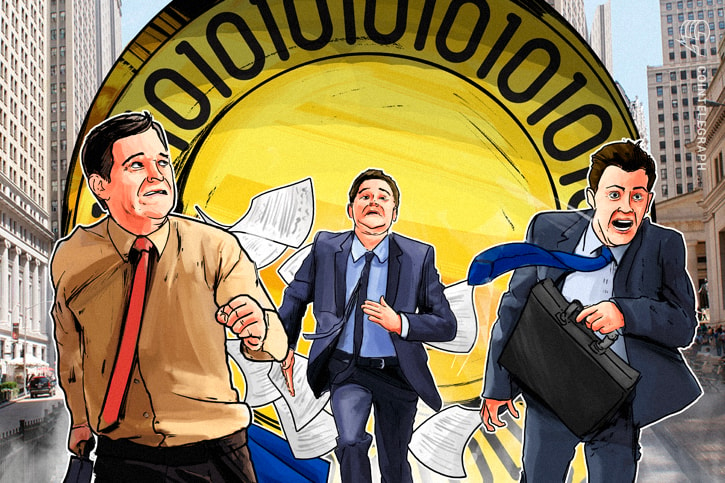Finance experts in the traditional finance industry often attempt to discredit Blockchain projects and open-source cryptocurrencies like Bitcoin and Ethereum. But, without solid logical arguments, a lot of baseless claims from the finance sector have proven to be ineffective.
Go-to Argument
The go-to argument by economists against the idea of the cryptocurrency market and decentralized Blockchain has been their lack of intrinsic value. Some economists and nobel award-winning researchers have claimed for several years that the lack of intrinsic value in Bitcoin and other cryptocurrencies make them vulnerable to massive price drops and volatility.
Intrinsic value
In December 2017, Bruce Flatt, CEO at asset management company Brookfield, which is based in Canada and oversees around $250 bln in assets, stated:
“It [Bitcoin] has no intrinsic value. I don’t know what it is. But it has no intrinsic value in our definition of intrinsic value. If someone else wants to speculate on it or invest in it, it’s for them. It’s not for us.”
However, every single asset, currency, and commodity in the global market such as gold, the US dollar, and company shares also do not have intrinsic value, and the Flatts claims can be applied to any asset in any major stock market globally.
Tom Lee, a strategist at Wall Street-based hedge fund Fundstrat, stated that no asset in the world has intrinsic value. Gold, the largest store of value and safe haven asset in the global market with a market valuation of $7 trln, also does not have intrinsic value, Lee said, as a large supply of gold can be discovered and potentially impact the international gold market.
"There are potentially millions of times more gold underground than actually has been extracted,” said Lee, adding that no asset in the US stock market has intrinsic value because they are built on digital trust. "If you ask a baby boomer, 'Can you justify the value of anything that's a digital business?' they probably don't accept that Facebook, Google, Netflix, Amazon, Apple, these are the largest companies in the S&P 500 and they're primarily digital businesses built almost purely on digital trust.”
Bubble
On Feb. 20, Cointelegraph reported that Elliott Management, a major hedge fund founded by billionaire Paul Singer in 1977, went as far to describe the cryptocurrency market as a bubble, a fraud, and limitless ignorance of the human race. Elliott Management said:
“But is it not glorious that when the equivalent of nothing attracts priests and parishioners who run up the price, the very willingness of the mob to buy it at higher and higher prices is seen as validation of the thing, rather than an indication of the limitless ignorance of swaths of the human race?”
But, as a hedge fund, Elliott Management failed to acknowledge that the free market operates on the basis of supply and demand. “The mob” of investors in the cryptocurrency market are willing to buy cryptocurrencies at current prices because they see value in them. Both minor and major corrections occur in the cryptocurrency market due to supply and demand, when investors are not willing to meet the price set by the sellers. That is how every modern market operates, and the same model is applied to stock markets as well.
Fear
Cointelegraph also reported that JPMorgan, the largest investment bank in the world with a $400 bln market cap, admitted cryptocurrencies are a risk and a threat against the business model of the bank. The annual report of JPMorgan read:
“Both financial institutions and their non-banking competitors face the risk that payment processing and other services could be disrupted by technologies, such as cryptocurrencies, that require no intermediation.”
Bitcoin and other cryptocurrencies can be considered a threat against the business model of most major banks because the market they target is the offshore banking industry. Open-source and decentralized cryptocurrencies can transfer large sums of money with less fees and efficiently than the infrastructures of large banks.
Good sign
The demonstration of fear and opposition against the cryptocurrency market by large-scale financial institutions and those who fail to understand the technological foundations of cryptocurrencies is an optimistic sign for the long-term growth of the market, as it demonstrates the potential of cryptocurrencies to compete with banks.
On March 14, Europe’s biggest insurer Allianz Global, which oversees more than $620 bln worth of assets, told its clients that Bitcoin is worthless, and that the cryptocurrency has almost zero intrinsic value. The company’s head of global economics and strategy, Stefan Hofrichter said:
“In our view, its intrinsic value must be zero. A Bitcoin is a claim on nobody – in contrast to, for instance, sovereign bonds, equities or paper money – and it does not generate any income stream.”
Hofrichter further noted that the bubble of Bitcoin will inevitably burst, and its demise will not have a major impact on the global economy, adding:
“Bitcoin’s demise would have few spillover effects on the ‘real world,’ since the market for this cryptocurrency is still quite small in size. As a result, we believe that the risks to financial stability stemming from bitcoin are negligible -- at least as of today.”
The claims of companies like Allianz Global that argue a $350 bln market with a daily trading volume larger than most stock markets can fall to zero is illogical, given that like the stock market, the cryptocurrency market also depends on supply and demand. If the demand for cryptocurrencies increases, the value of digital assets increase and if the demand falls, the price drops.
Unbacked and baseless condemnation on bitcoin and the cryptocurrency market by experts without fundamental knowledge in the structure, technology, and economic impact of cryptocurrencies would continue to fuel public demand for the cryptocurrency market.
The views expressed here are the author’s own and do not necessarily represent the views of Cointelegraph.com


